Basset Hound: Discover their rich history, unique traits, expert training tips, and why they’re excellent trackers and loving family pets.
Introduction
Imagine a dog with a low-slung body, long drooping ears and a captivating gaze, ambling through the fields with its nose close to the ground, tracking scents with unparalleled precision. Introducing the Basset Hound hunting dog, known for it’s keen sense of smell, their unwavering persistence and tracking ability. These dogs have a rich history and a unique place in the hearts of hunters and dog lovers alike.
This guide is crafted for anyone intrigued by the Basset Hound’s unique qualities, whether you’re a hunter in search of a reliable tracker or a dog enthusiast looking to understand more about this breed. Join us, as we uncover the fascinating world of the Basset Hound and learn why they are such beloved companions and efficient hunters.
Basset Hound: Origin and History
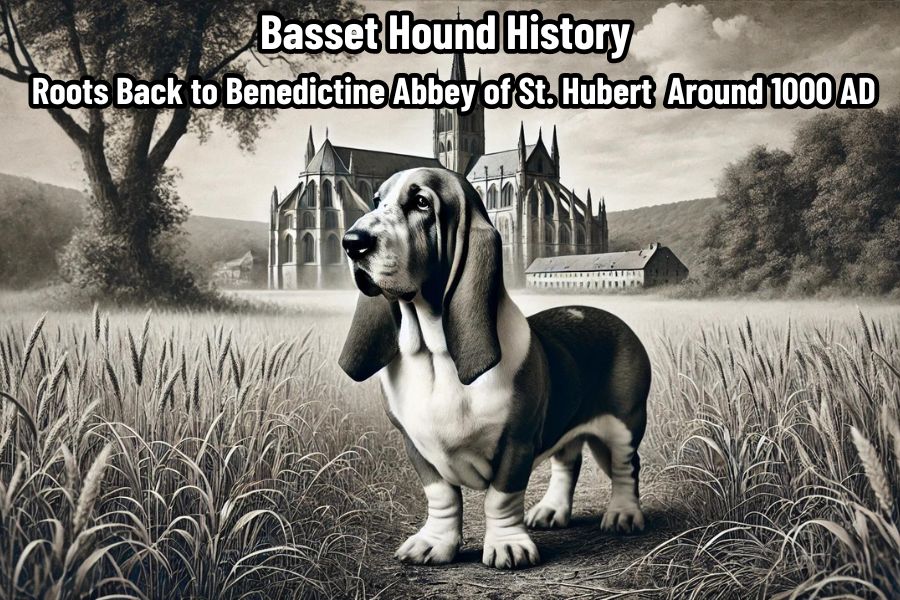
Basset Hound history, a fascinating tale of ancient lineage, purposeful breeding, and global popularity. This section delves into the breed’s rich history, tracing its origins and evolution from medieval Europe to its current status as a beloved companion and hunting dog.
Ancestors
Basset Hound origin, their lineage traces back to 6th-century hounds owned by St. Hubert of Belgium. These hounds were bred at the Benedictine Abbey of St. Hubert and eventually became known as St. Hubert’s Hounds around 1000 AD. The term “Basset” itself has French roots, meaning “low” or “dwarf,” reflecting the basset breed’s distinctive short stature. These early Basset-type dogs were highly valued for their tracking abilities, especially in dense forests where their low height and keen noses were advantageous.
Evolution
The Basset Hound, as we know it today, is a product of selective breeding over centuries. Its development involved crossing various breeds to enhance its tracking prowess. The first mention of a “Basset” dog appeared in Jacques du Fouilloux’s illustrated hunting text, *La Venerie*, in 1585. These dogs were depicted hunting foxes and badgers, showcasing their utility in hunting small game.
In the 19th century, French Basset Hounds were introduced to England, significantly influencing the breed’s development. By the 1870s, Basset Hounds were being imported into England, where the first breed standard was established. This standardization helped define the breed’s characteristics, such as its short legs, long ears, and exceptional scenting ability.
In 1959, a specific variety of Basset Hound bred for hunting by Colonel Morrison was recognized by the Masters of Basset Hounds Association. This variant featured longer legs and shorter ears, designed to enhance its hunting capabilities.
Breed Status
The Basset Hound breed standard underwent an update in 2010 to refine its characteristics further. Today, the Basset Hound enjoys widespread popularity, particularly in the USA, where it is cherished both as a hunting companion and a family pet. With thousands of registered Basset dogs, the breed continues to thrive worldwide, admired for its distinctive appearance and gentle disposition.
Kennel Clubs
The Basset Hound has earned recognition from major kennel clubs across the globe:
- American Kennel Club (AKC): Recognized in 1885, the AKC has played a significant role in promoting the breed in the USA.
- United Kennel Club (UKC): Also recognizes the Basset dog, supporting its development and standards.
- The Kennel Club (TKC): In the UK, the breed was recognized in the late 19th century, with the first breed standard established during this period. –
- Canadian Kennel Club (CKC): Recognizes the Basset dog, contributing to its popularity in Canada.
Other notable organizations include specialized Basset Hound clubs that focus on preserving the breed’s unique qualities and promoting responsible breeding practices.
Basset Hound In Action
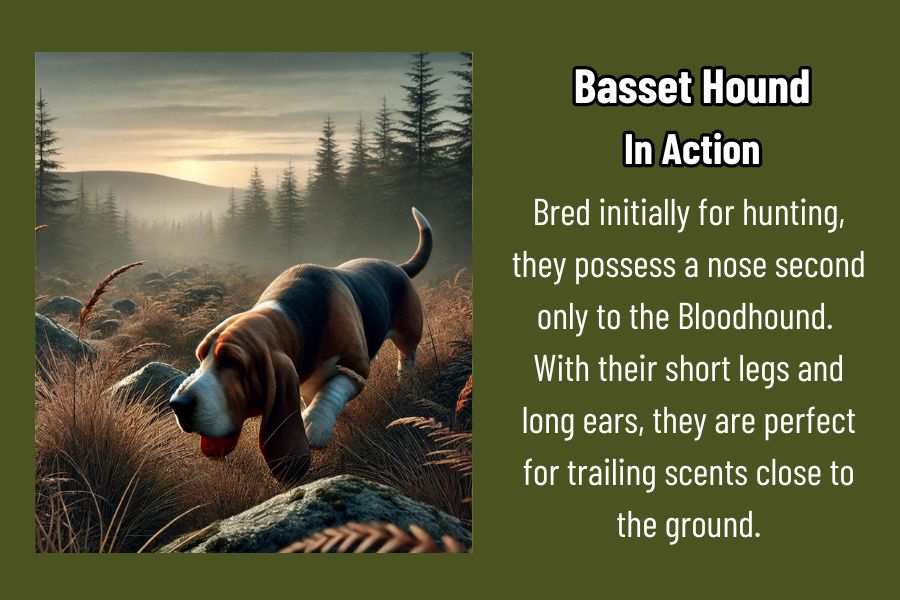
The Basset Hound’s remarkable abilities extend far beyond its adorable, droopy appearance. This breed’s natural talents and instincts make it an exceptional and versatile working dog, especially in the realm of hunting.
Hunting Dog
The Basset Hound is classified as a scenthound, renowned for its extraordinary sense of smell. Bred initially for hunting, these dogs possess a nose second only to the Bloodhound.
The Basset’s primary hunting job revolves around ground-scent tracking, a skill for which they are uniquely suited. With their short legs and long ears, they are perfect for trailing scents close to the ground. They have a long history of hunting small game like rabbits and hares through dense underbrush and challenging terrain. Additionally, Basset dogs have also been used to track larger wounded game, showcasing their versatility and determination.
Their hunting process is characterized by a methodical, slow-paced approach, ensuring that the hunter can keep up with them on foot. These hunting hounds work diligently, nose to the ground, following the scent trail until they locate the prey.
Other Roles
Beyond their hunting capabilities, Basset Hounds excel in various other roles, demonstrating their adaptability and intelligence. Their scenting ability makes them valuable participants in field trials, where their tracking skills are put to the test. Their keen noses are also utilized in detection work, and their persistence and reliability make them excellent candidates for Search and Rescue missions.
In conformation dog shows, Basset Hounds captivate judges and spectators with their unique appearance and charming demeanor. They are increasingly found in therapy dog programs, bringing comfort and joy to those in need. The Basset’s natural talents shine through in many areas, proving that they are much more than just a tracker.
Basset Hound Physical Traits
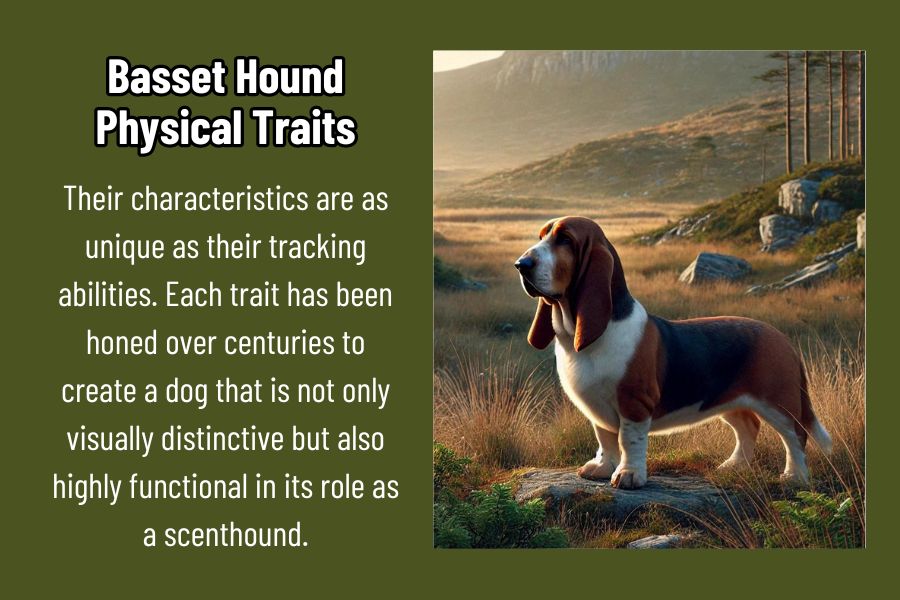
The Basset Hound’s physical characteristics are as unique as their tracking abilities. Each trait has been honed over centuries to create a dog that is not only visually distinctive but also highly functional in its role as a scenthound. This section delves into the various physical aspects that make the Basset dog so special.
Size (Length and Height)
Basset Hound size, they are known for their low-slung bodies and typically, an adult stands between 11 to 15 inches at the shoulder. Despite their short stature, they can be quite long, measuring around 26 to 35 inches from the tip of the nose to the base of the tail. This unique size makes them exceptionally adept at tracking ground scents while remaining close to the trail.
Head and Muzzle
The Basset Hound’s head is large and well-proportioned, featuring a domed skull and a pronounced occipital bone. Their long, droopy ears, which can extend beyond their nose when lowered, are a key characteristic. These ears help stir up scents from the ground, enhancing their tracking abilities. The muzzle is deep and broad, with loose, wrinkled skin around the face that gives the breed its distinctive, endearing expression.
Body Structure and Weight
The body of a Basset Hound is long and robust, supported by strong, short legs. This structure is designed for endurance rather than speed, allowing them to follow a scent trail for extended periods. Adult Basset dogs typically weigh between 40 to 65 pounds. Their heavy bone structure and muscular build give them the strength needed for their tracking duties.
Coat Type and Colors
Basset Hounds have a short, smooth, and dense coat that provides protection against the elements while hunting. Their coat comes in various color combinations, including tricolor (black, white, and brown), bicolor (lemon and white), and red and white. These colors can appear in different patterns, adding to their unique appearance.
Keen Senses for Tracking
Basset Hounds possess an extraordinary sense of smell, second only to the Bloodhound. Their large nasal passages allow them to process scents with remarkable efficiency. Combined with their long ears that help trap and waft scents towards their nose, and their wrinkled skin that captures and retains scent particles, they are natural born trackers
Tail Structure and Purpose
The Basset Hound’s tail is long, slightly curved, and often carried high. It is covered in coarse hair and has a distinctive white tip, which makes it easier for hunters to spot the dog in dense underbrush. The tail serves as a signal, wagging vigorously when the hound is on a scent trail, alerting hunters to the presence of game.
Energy and Endurance
Despite their calm demeanor, Basset Hounds possess significant stamina and endurance. They are built for a long steady pace rather than short bursts of speed. Their energy levels make them excellent hunters as well as great companions for outdoor activities. Although, they love to be outside tracking a scent, they also enjoy lounging at home.
Life Expectancy
Basset Hounds generally have a life expectancy of 10 to 12 years. With proper care, including a balanced diet, regular exercise, and routine veterinary check-ups, they can live a healthy and fulfilling life.
Gestation Period and Litter Size
The gestation period for a Basset Hound is approximately 63 days, similar to other dog breeds. On average, a Basset litter consists of 6 to 8 puppies, though litter sizes can vary. Breeding requires careful planning and knowledge to ensure the health and well-being of both the mother and her puppies.
Basset Hound Behavioral Traits
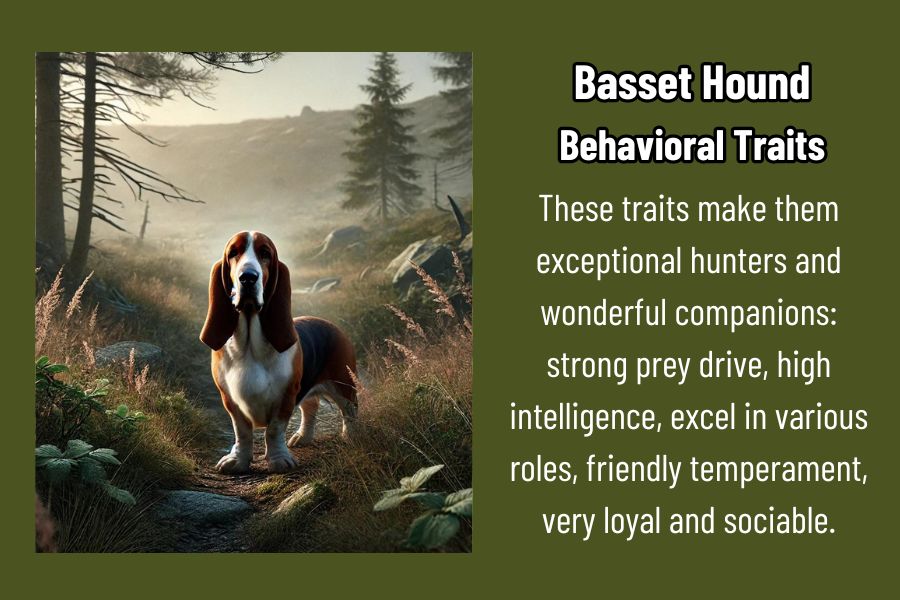
The Basset Hound is not only known for its distinctive physical traits but also for its unique and endearing behavioral characteristics. These traits make them exceptional hunters and wonderful companions. Let’s explore some key behavioral aspects.
Prey Drive
Basset Hounds have a strong prey drive, a trait that is deeply embedded in their history as hunting dogs. Their powerful sense of smell and relentless determination make them exceptional trackers. Once they catch a scent, they are focused and persistent, often ignoring distractions to follow the trail. This high prey drive means they need regular mental and physical stimulation to keep them engaged and happy.
Intelligence
While Basset Hounds are intelligent, their independent nature can sometimes be mistaken for stubbornness. They are quick to learn and have a remarkable ability to remember scents. However, their intelligence is often displayed in a more laid-back manner compared to other breeds. Training Basset dogs, requires patience and consistency, as they can be selective in their obedience, especially if a scent captures their interest.
Versatile
The versatility of the Basset Hound is one of its standout traits. They excel in various roles beyond hunting, including participating in dog sports, search and rescue missions, and even as therapy dogs. Their calm demeanor and sharp noses make them suitable for a wide range of activities, showcasing their adaptability and broad skill set.
Temperament
Basset Hounds are known for their gentle and friendly temperament. They are generally calm and laid-back, making them excellent companions for families and individuals alike. Despite their hunting background, they are not aggressive and tend to get along well with other dogs and pets. Their even-tempered nature makes them particularly well-suited for households with children.
Loyal
Loyalty is a hallmark of the Basset Hound. They form strong bonds with their owners and are known to be incredibly affectionate. This loyalty is evident in their desire to be near their family members, often following them around the house. Their strong attachment makes them great watchdogs, alerting their owners to any unusual activity.
Family Compatibility
Basset Hounds are highly compatible with family life. Their patience and gentle nature make them excellent with children, and they enjoy being part of the family activities. They are tolerant and can adapt well to various living environments, whether in a house with a yard or an apartment. Their sociable nature means they thrive on companionship and can become lonely if left alone for extended periods.
How to Choose the Right Basset Hound Puppy?
Choosing the perfect Basset Hound puppy involves more than just picking the cutest one from the litter. It’s essential to consider the breed-specific traits and ensure the puppy you choose fits your lifestyle and expectations. Here are some key tips to help you select the right puppy.
Thoroughly Examine Breeders and Pedigree
When selecting a Basset Hound puppy, start by researching reputable basset breeders. A responsible basset breeder should provide detailed information about the puppy’s pedigree, including the health history of the parents. Look for breeders who conduct genetic testing to screen for common hereditary conditions such as hip dysplasia, elbow dysplasia, and eye disorders. Visiting the breeder’s facility will give you an idea of the environment in which the puppies are raised, ensuring they are well-cared for and socialized from an early age. Avoid breeders who cannot provide health clearances or seem hesitant to answer questions about the puppy’s lineage and care.
Evaluate Puppy Temperament and Behavior
Basset Hounds are known for their gentle and friendly nature, but individual puppies can have varying temperaments. Spend time observing and interacting with the puppies to gauge their behavior. Look for signs of a well-balanced temperament, such as curiosity, playfulness, and a willingness to approach people. A good Basset puppy should not be overly aggressive nor excessively timid. Additionally, consider how the puppy interacts with its littermates, as this can provide insights into its social behavior. Remember, a puppy that is well-socialized from an early age is more likely to grow into a confident and well-adjusted adult dog.
Verify Health Status and Energy Levels
A healthy Basset Hound puppy should be active, alert, and exhibit a good level of energy. Check for clear eyes, clean ears, and a shiny coat, which are indicators of good health. Ask the breeder for a recent veterinary health check and vaccination records. It’s important to make sure the puppy has been checked for breed specific health issues. Additionally, observing the puppy’s energy level can help you determine if it matches your activity level and lifestyle. It’s also, wise to consult your own veterinarian before you select a puppy.
Caring for your Basset Hound
Caring for a Basset Hound involves understanding their specific needs. Here are some key tips regarding nutrition, exercise, grooming, and medical care.
Nutrition Tips
Feeding your Basset Hound a balanced diet is crucial for their overall health and well-being. Given their propensity for weight gain, it’s essential to monitor their calorie intake. Choose high-quality dog food that lists meat as the first ingredient and is free from excessive fillers. Basset dogs benefit from a diet rich in protein to support their muscular build and limited fat content to prevent obesity. Divide their meals into two or three portions a day to maintain steady energy levels and reduce the risk of bloat, a condition they are prone to. Avoid giving them table scraps and treats high in fat and sugar.
Routine Care Tips
- Exercise: Despite their laid-back nature, Basset Hounds need regular exercise to maintain a healthy weight and mental stimulation. Daily walks, combined with play sessions, are ideal. However, avoid strenuous and jumping activities that could strain their long backs and joints.
- Grooming: Basset Hounds have short coats that are relatively easy to maintain, but they do shed. Brush them weekly to remove loose hair and keep their coat shiny. Due to their long ears, Basset’s are prone to ear infections, so clean their ears regularly to prevent buildup of wax and debris. Check their skin for signs of irritation or infection, especially in the folds around their neck and face. Regular nail trimming is also essential to prevent overgrowth and discomfort.
Preventive Care Tips
- Regular Vet Visits: Schedule regular veterinary checkups to keep your Basset Hound up-to-date on vaccinations and preventative treatments for heartworms, fleas, and ticks. Being vigilant about their health and seeking prompt veterinary care when symptoms arise can significantly enhance their quality of life.
- Potential Health Issues: Basset Hounds are susceptible to specific health problems, including yeast infections, cherry eye, glaucoma, gastric dilatation volvulus (bloat), and various skin diseases. According to a 2004 UK Kennel Club survey, the leading causes of death for Basset Hounds were cancer, gastric dilatation volvulus, and cardiac issues.
Forging Relationship
Building a strong bond with your Basset Hound is a vital aspect of their care. These dogs thrive on companionship and affection, making them loyal and loving pets. Spend quality time with your Basset through play, training, and regular interactions to strengthen your relationship. Positive reinforcement training not only helps with behavior but also deepens your bond. A well-socialized and loved Basset Hound is more likely to be happy, confident, and well-adjusted.
Basset Hound Training Tips
Basset Hound training can be a rewarding experience, but it requires patience and consistency due to their independent and sometimes stubborn nature. It is important to focus first on obedience training. They respond well to positive reinforcement techniques and consistent training routines and commands. Here are 6 key control commands to help you get started training your Basset Hound.
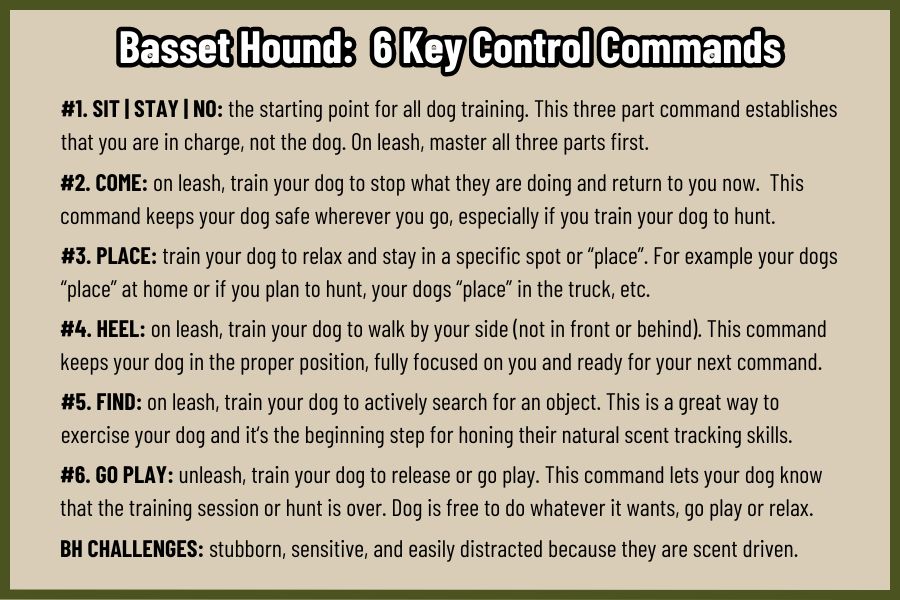
Stick To Your Training Plan
Consistency is vital when training a Basset Hound. These dogs thrive on routine and clear expectations. Sticking to a consistent training plan helps reinforce desired behaviors and reduces confusion. Use the same commands and training methods consistently to create a clear understanding of what is expected. Inconsistent training can lead to mixed signals, making it harder for your Basset to learn and adhere to the rules.
Why a Professional Trainer Might Be the Best Solution?
Basset Hounds, with their strong-willed nature, can sometimes be challenging to train, especially for first-time dog owners. Professional trainers bring expertise, experience, and tried-and-true methods tailored to the breed’s specific needs. Your Basset needs proven and structured training methods. If you don’t have the time to commit to consistent training including dependable leadership and guidance, a professional trainer would be your best solution.
Conclusion
The Basset Hound is a breed with a fascinating history, distinctive physical and behavioral traits, and a versatile range of capabilities. From their origins as skilled hunting dogs to other roles as search and rescue dogs, show dogs and beloved family pets, they are truly a remarkable breed.
Whether you’re seeking a dedicated hunting companion or a loyal and affectionate household pet, the Basset Hound offers a unique combination of charm and utility. If you want to learn more about the masters of scent and endurance, check out our post on scenthounds.
FAQs: Basset Hound
What are Basset Hounds known for?
Basset Hounds are renowned for their exceptional sense of smell, which is second only to the Bloodhound. Their long ears help trap scent particles, making them outstanding trackers. They are also known for their distinctive low-slung bodies, droopy eyes, and gentle, friendly nature.
Why do Basset Hounds’ front feet turn out?
Basset Hounds’ front feet turn outwards to provide them with better stability and balance, especially when navigating through rough terrain. This unique conformation helps distribute their weight more evenly across their broad chests, aiding in their tracking duties by allowing them to move steadily and methodically.
How much does a Basset Hound cost?
A Basset Hound cost can vary widely depending on factors such as breeder reputation, pedigree, and location. On average, you can expect to pay between $600 to $1,500 for a Basset Hound puppy from a reputable breeder. Show-quality puppies or those with champion bloodlines can cost significantly more.
Are Basset Hounds aggressive?
No, Basset Hounds are generally not aggressive. They are known for their calm and friendly disposition, making them excellent companions for families and individuals alike. While they may bark to alert their owners of strangers, they are typically gentle and get along well with other pets and children.
Are Basset Hounds good off leash?
Basset Hounds are not usually recommended to be off leash in unsecured areas due to their strong prey drive and exceptional sense of smell. Once they catch an interesting scent, they can become single-minded and difficult to recall. It’s best to keep them on a leash during walks to ensure their safety and prevent them from wandering off.
What are the cons of a Basset Hound?
Basset Hounds can be challenging to housebreak due to their independent nature. They are also known to howl when bored, which can be loud and disruptive. Additionally, they are champion beggars, often using their soulful eyes to coax treats from their owners, leading to potential weight issues. Health-wise, they are prone to conditions such as ear infections, hip dysplasia, and gastric dilatation volvulus (bloat).
Resources: Basset Hound
SPECIAL NOTE: “The information provided in this post is based on Google research and the Resource links listed below. While we try to keep the information for this post current, there are no representations expressed or implied, about the completeness, or accuracy of the information provided. Therefore all hunters should always verify current information from these resources along with other local and federal publications”.
Online Resources
- AKC – American Kennel Club
- TKC – The Kennel Club
- UKC – United Kennel Club
- CKC – Canadian Kennel Club
Best Books
- “The Basset Hound Owner’s Survival Guide” by Diane Morgan – This book covers everything from basic care to advanced training tips, making it a comprehensive guide for new and experienced owners.
- “Basset Hounds (Complete Pet Owner’s Manual)” by Joe Stahlkuppe – A thorough manual that provides detailed information on the breed’s history, physical traits, behavior, and health care.
- “Basset Hound Bible and Basset Hounds: Your Perfect Basset Hound Guide” by Mark Manfield – An in-depth guide that covers all aspects of owning a Basset dog, including training, nutrition, and health care.
- “Basset Hounds For Dummies” by Susan McCullough – A user-friendly book that offers practical advice and expert tips on raising a happy and healthy Basset dog.
- “The New Complete Basset Hound” by Mercedes Braun – This classic reference provides a deep dive into the breed’s history, characteristics, and care, making it an essential read for enthusiasts.

